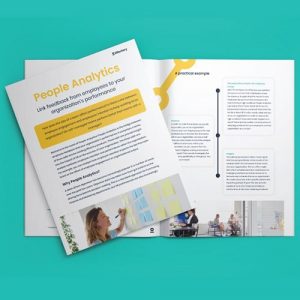Should we be alarmed, or should we embrace the use of machine learning and other algorithms to make decisions about people? Well, here are my two cents on the topic.
Is using data algorithms and machine learning to analyze people ethical?

Employee data
Nowadays, most organizations have been able to gather large amounts of data about their employees. Every step during an employee journey can be traced – from before the onboarding phase starts until after an employee leaves an organization.
At the basic level you have the demographic information such as age, gender, tenure, salary, and so on. This kind of data allows us to understand the characteristics of the people within an organization. Then there’s data that say something about how the employees function within the organization, such as individual and team performance figures. Adding to that, an increasing number of organizations have now created a feedback landscape to ensure that the voices of their employees reach HR and those in the lead. With such information we can better understand the experiences of employees in their work-place, which can be measured as organizational and employee-level themes, such as engagement and job satisfaction.
When taken together, all of these different kinds of data sources can be linked. And with the help of data science technology, we are able to analyze large data sets to make connections between the different employee aspects of the data. For example, looking into how team size relates to team performance.
Create impact with People Analytics
Link feedback from employees to your organization’s performance
DownloadThe question of ethicality
Is it actually ethical to use machine learning and algorithms for making decisions about people?
With the advancements of data science technology and the possibilities they create (sometimes even in real-time), an important question arises: is it actually ethical to use machine learning and algorithms for making decisions about people?
Many people say it isn’t ethical because surely humans can do a better job than machines. Of course, I am not arguing for a total elimination of humans for solving people-related problems. But I am in favor of removing human bias, stereotyping, and over-reliance on solutions from the past, simply by letting machines do the number crunching and come up with data-driven insights.
For my answer to the question of ethicality, I would like to start by using two analogies.
Cars, knives and People Analytics…
Let’s begin with one about cars. When buying a car twenty years ago, features such as adaptive cruise control or a navigation system were not available. With time, these features went from becoming an option to being included as a standard in almost every car. Nowadays even self-driving cars are on the brink of break-through, which use machine learning algorithms to, for example, avoid imminent collisions. In this case, the technological advancements have only been used for the benefit of everyone on the road, both in terms of safety and enhanced experience.
The second analogy is one about knives. A knife can be used to cause serious harm to others. However, when put in the right hands, it is also a tool for creating great things. For example, a cook preparing a culinary dish, or a surgeon saving the life of a patient. What it comes down to is the intention behind using the knife, and the actions that follow.
The Future of HR Special Report
Technology is changing how HR will function in the future. This report explores the impact of AI & big data plus how to use employee engagement for growth.
DownloadThe case for People Analytics
In the case of using machine learning or algorithms for making people decisions in organizations, these two analogies demonstrate that it can be ethical when put in the right hands with the right intention.
People Analytics is an incredibly impactful tool for solving organizational problems, and optimizing organizational outcomes. Especially machine learning technology can discover hidden patterns in data, that humans would never be able to grasp.
The key to ethical practice lies in it being used for the benefit of the employees involved. So, taking a critical look at the underlying intention before using People Analytics is a must. A good place to start is to go by this simple rule of thumb: if you cannot explain the benefit of People Analytics or machine learning to the people who are being analyzed, then don’t use it. If you can, then you’re good to go!

